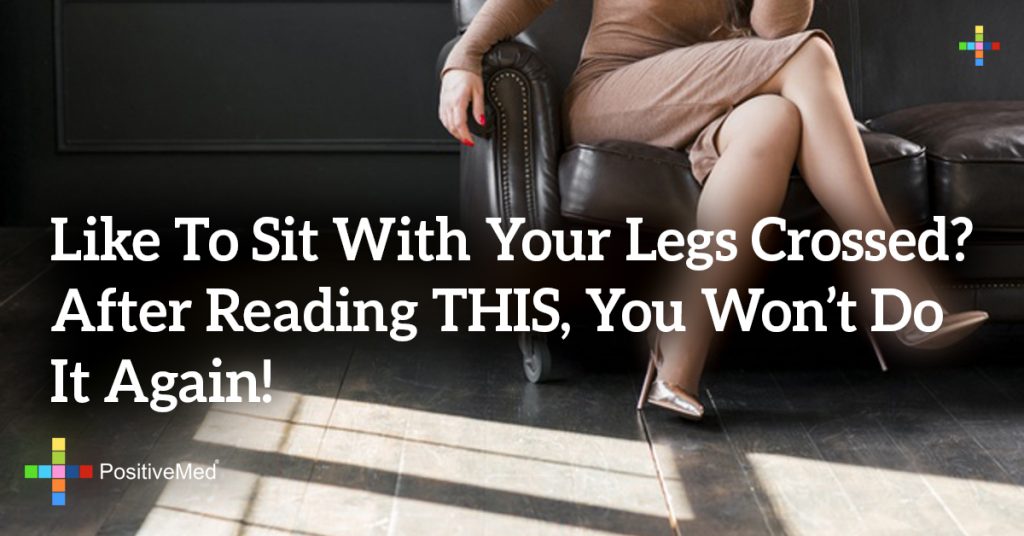
Like To Sit With Your Legs Crossed? After Reading THIS, You Won’t Do It Again!
If you do an internet search for, “Is sitting with your legs crossed badly for your health?” you will get myriad conflicting answers. Some say the claims that sitting crossed-legged is bad for your health is a myth and other sources stand by the claim that, yes, sitting with crossed legs is bad for your health. This article is going to explain why the latter is true and why claims that it’s just a myth may be misleading. The areas of health that are affected include the cardiovascular system, peripheral nerves, and posture.

Cardiovascular System
Ever faint? Well, there are folks out there who actually have a condition where fainting, happens frequently it’s called syncope. According to the American Heart Association:
Syncope is a temporary loss of consciousness and posture, described as “fainting” or “passing out.” It’s usually related to temporary insufficient blood flow to the brain. It most often occurs when the blood pressure is too low (hypotension) and the heart doesn’t pump a normal supply of oxygen to the brain.
Did you know that crossing the legs has been shown to help manage syncope in patients with this medical condition? Yes, there was a study published in 2004 in the Journal of Clinical Autonomic Research that reviewed ways to treat syncope without medicines and guess what, leg crossing while standing or sitting and tensing muscles is an acceptable method of controlling the low blood pressure that leads to fainting because this posture, RAISES BLOOD PRESSURE!
For further proof of this phenomenon researchers looked into the effect of crossing the legs on blood pressure, and sitting with the legs crossed at the knee was shown to raise systolic blood pressure between 3% and 7% based on whether the person had normal blood pressure, was hypertensive, or diabetic.
Professionals that say that sitting with legs crossed is not bad for your health are focusing too much on the fact that it probably won’t kill the normal person with the 3% increase, but considering that 1 in 3 adults have high blood pressure and nearly 10% of the population has diabetes, it’s certainly a posture that should be discouraged.
Peripheral Nerves
Have you ever been sitting with your legs crossed for a long stretch and experience numbness and tingling in your foot. Most likely sitting this way causes trauma to your Peroneal Nerve, which is a branch of the sciatic nerve that provides sensation, movement to the lower leg, foot and toes.
There are various factors that can cause harm to the nervous system. Nerve signals from the brain (central nervous system) to the body can be disrupted due to disease in the brain, trauma to the nerves themselves. Most folks would not consider prolonged sitting with the legs crossed at the knee as “traumatic.” However, the constant pressure and tension on the nerve have been shown to cause palsy of the Peroneal Nerve both anecdotally and in research.
RELATED ARTICLE: Leg Pain And Numbness: The Meaning And Non-Surgical Treatments
This occurs because while sitting with the legs crossed at the knee, the Peroneal Nerve is trapped between two bones being pressed together at it’s a most superficial region near the head and neck of the fibula. The National Institutes of Health even list, “Crossing legs regularly” as a cause for dysfunction of the common Peroneal nerve. You may not see your foot falling asleep from crossing your legs as a huge concern, but dysfunction in the Peroneal Nerve can also lead to toe drop and walking problems.
Posture
Sitting with the legs crossed is one of the 7 deadly postural sins! Especially if you sit prolonged in this position, and if it is the normal position in which you sit.
Technically you should be sitting in a position that directly translates from the anatomical position. Anatomical position is standing with the feet hip distance apart, the spine erect and “neutral” (maintaining the natural “S” shape of the spine), and the arms down by the sides of the body. When seated, the healthiest posture is, therefore, seated with the feet and knees hip distance apart. Sitting equally on both hips, with a neutral spine.
Sitting with the legs crossed causes the pelvis to tilt forward, bringing your spine out of neutral and causing more pressure on your lower back and sacrum, which most likely will lead to other postural deviations to compensate such as learning or rotating the trunk to one side, which creates further imbalance in the pelvis.
Furthermore, studies prove that the trunk and lumbopelvic muscles show the most activity, and, therefore, are supporting you most when the spine is aligned and erect. Considering that 80% of adults experience low back pain, sitting with crossed legs should definitely be avoided.
The myth busters are correct that sitting with your legs crossed will not likely lead to a horrible tragic death, but who wants to live habitually sitting in a posture that won’t kill you but may increase your risk for muscular pain, discomfort, numbness in the leg and foot, shooting sciatic pain down your butt and calf.
Sitting with your legs crossed may not kill you but it can lead to health risks that you may just want to avoid.
Nonpharmacological treatment of reflex syncope
Clinical Autonomic Research, 2004, Volume 14, Number 1, Page i62
Wouter Wieling, Nancy Colman, C. T. Paul Krediet, Roy Freeman
Weiss, I. I. (1949). CROSSED LEG PALSY with Report of a Recurrent Case. California Medicine, 71(1), 33–35.





